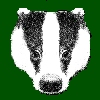 |
www.badgerland.co.uk |
| News about Badgers in the UK |
| Home | Shop | Animals | Pictures | Help | Seeing | Groups | Education | News | Search | Books |
| Badgerland | External | 2010 | 2009 | 2008 | 2007 | 2006 | 2005 | 2004 | 2003 | 2002 | 2001 | 2000 | 1999 | 1998 | 1997 | 1996 |
|
|
|
Badgers filmed in cattle food foray
27th June 2002 - BBC NewsScientists have shown how badgers will sometimes forage in farm buildings at night looking for food. They say the activity could explain how tuberculosis is spread amongst cattle by the nocturnal creatures - something which is hotly disputed by conservationists. The researchers, who report their work through the UK's academy of science, the Royal Society, say farmers should implement better biosecurity measures on their property to prevent wild animals making contact with livestock and their feed. Badgers are currently being slaughtered in a test programme funded by the government to see if a wider cull would have an impact on the incidence of bovine TB. It is estimated TB infection in cattle costs the UK's agriculture industry around £60m a year. Farmers must slaughter infected animals and face restrictions on the movement of their herds. Although many farmers and scientists blame badgers for the TB problem, the link is a controversial one and the National Federation of Badger Groups (NFBG) was quick to criticise the methods and conclusions of the latest study. It was conducted by researchers from the University of Sussex and the Central Science Laboratory. They filmed the badgers at night foraging in barns and sharing food with the cows on two farms in Gloucestershire. The research team says the feed in the barns became mixed with badger urine and droppings. They say some of the badgers were known to be infected with TB and that both farms suffered bovive TB outbreaks during the course of the study. However, the study does not provide any direct evidence to prove badgers are to blame for the spread of bovine TB. "Research on transmission routes has focused on cattle grazing on contaminated pasture," said Ben Garnett, one of the University of Sussex scientists involved in the study. "However cattle will usually avoid feeding on pasture contaminated by badger excreta and the TB bacterium does not survive long on summer pastures." He continued: "This study shows the practice of storing farm animal feeds in facilities that can be accessed by badgers can result in direct and indirect contact between badgers and cattle that could lead to infection." Jan Rowe, National Farmers' Union animal health and welfare vice chairman, welcomed the study. It made sense to minimise direct contact between badgers and cattle: "This highlights the increase in badger activities that we have seen in recent years. "It also demonstrates that we need the results of the [badger slaughter] trial swiftly so that work can begin on a proper strategy to eradicate bovine tuberculosis." But the National Federation of Badger Groups (NFBG) said the latest study was deeply flawed. It said the use of only two badger social groups was unrepresentative, and there was no scientific 'control' to confirm the role these badgers had, if any, in transmitting bovine TB to the cattle. It was quite possible, the NFBG said, that the cattle already harboured bovine TB before the study began because an "unreliable skin test" was used to establish whether infection was present in the herds. The group said the study gave no information on how much contaminated feed was consumed by the cattle; the research was also conducted at a time of the year when most cattle would have been sent out to pasture anyway. The study focused only on badgers, it said, and ignored the possibility of TB transmission by other mammals with access to the farm, including rats and deer, both of which are carriers of bovine TB. Dr Elaine King, the NFBG's chief executive, said: "This weak and highly prejudicial piece of research manages to devote a huge amount of tax payers' money to giving the impression that badgers are the primary source of bovine TB transmission to cattle. "The most likely conclusion that farming unions will draw is that badgers should be culled. Yet the research pays scant attention to the real solution if indeed badgers are to blame: stop badgers eating cattle feed." The research is to be published in the journal Proceedings of the Royal Society: Biological Sciences.
|
|||||||||||||||||||||||||||||||||||